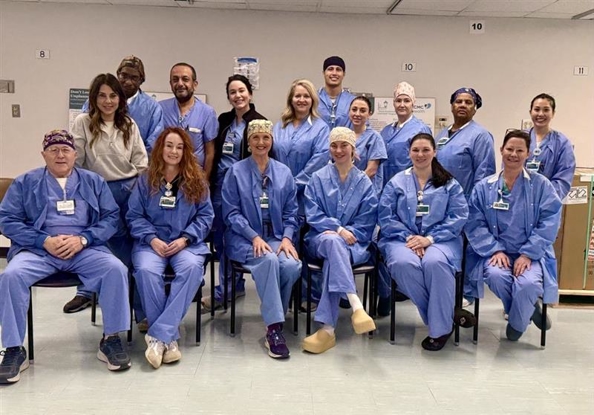Regaining independence: Treating normal pressure hydrocephalus at 73
- Category: Neuroscience, Brain & Spine Care
- Posted On:

One day, 73-year-old Patrick Pillot began experiencing trouble standing and walking. His condition quickly worsened—he started falling frequently and soon struggled to get back on his feet.
“I’d stand up and I’d fall. I couldn’t walk,” he recalled. “It was very scary. I couldn’t go anywhere. I couldn’t do anything. It got progressively worse and I kept falling and more often. I said, ‘No, this has got to end. Something’s got to happen.’”
The retired railroad worker went to the emergency room and was ultimately diagnosed with normal pressure hydrocephalus, a condition that usually occurs in older adults whose bodies are not able to reabsorb spinal fluid at the appropriate rate. The accumulation of fluid in the brain can cause trouble with one’s gait, confusion and neurological problems.
“Mr. Pillot had several months of deterioration of his gait and balance, and he was pretty much relegated to a wheelchair,” said Neurosurgeon Adam Podet, who ordered a spinal tap and a series of physical and mental tests which confirmed that Mr. Pillot would be a good candidate for a ventricular peritoneal shunt.
“The goal of the shunt is to divert spinal fluid from the ventricular system of the brain and into the peritoneal cavity of the abdomen,” Dr. Podet explained. “A small incision is made over the head through which we are able to guide a small catheter into the lateral ventricle to drain spinal fluid. The catheter is then connected to a valve underneath the scalp which is connected to another catheter that is tunneled underneath the skin into the abdomen so that fluid accumulating on the brain can now drain through the abdomen.”
The surgery took about two hours at West Jefferson Medical Center and greatly improved Mr. Pillot’s condition. He’s made a dramatic recovery with good improvement in his gait and balance. “His prognosis is good, his symptoms have resolved, and it should not affect him again,” Dr. Podet said.
Mr. Pillot is walking fine now and said, “It’s a miracle I can walk again. I intend to live another 20 years.”


